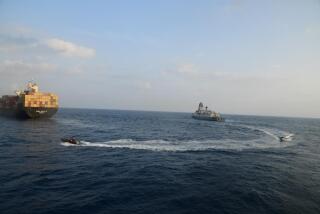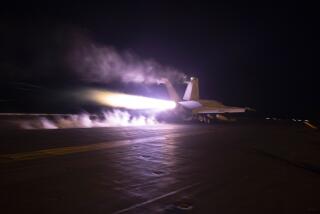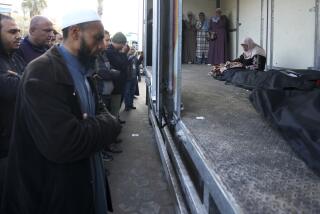Yemen security forces, tribal fighters clash in Sana
Gun battles raged across the capital Monday between government forces and fighters from Yemen’s most powerful tribe, prompting fears of civil war after President Ali Abdullah Saleh balked over the weekend at signing a transfer-of-power agreement.
Smoke billowed from fires at the Interior Ministry and the head office of the national airline, Yemenia, witnesses said. Nearby residents fled their homes when gunmen took over a school opposite the ministry to launch rocket-propelled grenades at the government building.
The sound of heavy machine-gun fire and explosions also echoed through the north of the city into the night.
Some of the fiercest fighting broke out at the home of Hashid tribal leader Sadiq Ahmar, whose supporters led the attacks on ministries, a day after Saleh declined to sign a pact that would see him hand over power to his vice president in a month.
Ahmar, a former supporter of Saleh and the head of Saleh’s tribe, turned his back on the president in mid-March after 52 antigovernment protesters were shot dead by pro-government snipers.
In the midst of heavy rain and thunderstorms, security forces clashed with Ahmar’s men into the evening as the sheik’s followers took over the Trade Ministry headquarters in Sana.
Further clashes were reported near the U.S. Embassy and a second location. Local news reports, which could not be verified, suggested thousands more Hashid tribesmen were attempting to enter the city to assist Ahmar.
The clashes began less than 24 hours after Saleh, who has ruled for 32 years, refused to sign a deal brokered by the Gulf Cooperation Council to relinquish power.
It was unclear who started the battles but residents said government forces fired at Ahmar’s home first. “They started attacking Sheik Ahmar’s house at about 1 p.m. and they’ve been fighting ever since,” said one witness as AK-47 gunfire rang through the streets.
Supporters of the president laid siege to the United Arab Emirates Embassy Sunday, seeking to prevent Western and Persian Gulf diplomats from reaching the presidential palace for the expected signing of the deal.
The gulf council subsequently announced suspension of its mediation efforts, after Secretary-General Abdullatif bin Rashid Zayani left Sana empty-handed for the third time in less than a month.
Secretary of State Hillary Rodham Clinton said in a statement that the U.S. was “deeply disappointed by President Saleh’s continued refusal to sign” the exit agreement. The U.S. also closed its consulate because of the violence.
The turn of events marked a blow for Saleh, who has been a U.S. ally in the battle against Al Qaeda. Saleh has defied the demands for his resignation during three months of unrest.
In a speech on state television late Sunday, Saleh blamed Yemen’s political opposition for the deal’s collapse and warned that it would be held responsible if civil war broke out.
“If [Yemen] is engulfed in a civil war, they will be responsible for it and the bloodshed,” he said.
As government reinforcements were sent to secure north Sana late Monday, a senior Yemeni official who declined to give his name condemned the day’s violence and blamed Ahmar.
“Today’s actions show the ill intentions of the Ahmar faction, which has been bankrolling the opposition movement and now is using heavy weaponry to attack and occupy government buildings,” the official said.
Craig is a special correspondent. Times staff writer Ned Parker in Baghdad contributed to this report.
More to Read
Start your day right
Sign up for Essential California for news, features and recommendations from the L.A. Times and beyond in your inbox six days a week.
You may occasionally receive promotional content from the Los Angeles Times.






